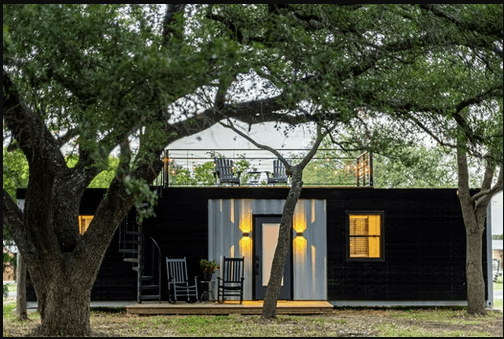The rise in popularity of tiny homes indicates a new trend may be emerging in the housing market. The COVID-19 pandemic, coupled with the rising cost of living as well as concerns for the environment is prompting a growing number of people to seek alternative means of accommodation. A large part of this countercultural movement is born out of a desire to live in a more socially conscious and sustainable way that promotes ideals such as living more simply and with less.
According to a 1PX 301 survey by Fidelity National Financial subsidiary, 56% of those surveyed said they would consider living in a tiny home, with 86% saying they would contemplate such a house as their first home, and 84% would consider retiring in one.
With the median price of a tiny home sitting somewhere between the $30,000 to $60,000 range, compared to a traditional home at around $233,400 cost is certainly one of the most compelling reasons to persuade people to invest. However, as this article has outlined there are several other benefits associated with buying a tiny house.
Smaller Carbon Footprint
As smaller spaces require less energy to heat or cool, tiny houses naturally consume less gas or electricity and many are installed with energy-saving systems which allow them to operate off-grid. Rather than fossil fuels, many tiny homes use renewable energy sources such as solar, wind or micro hydro for their energy needs.
There is only room for essential appliances in a tiny house, however, many inhabitants also prefer to live without many modern-day distractions such as widescreen television sets, stereo systems and other appliances which require electricity. Their smaller living area also means they require fewer light fixtures. Compared to the average house which needs 45 bulbs to properly light each room, tiny houses only require about six.
Promote Minimalism
While much of the world is gripped by consumerism and the need to amass more stuff, tiny home inhabitants embrace a simpler way of living where ‘less is more.’ Due to its small size, living in a tiny house will require you to declutter and get rid of possessions that you do not need or use. By donating, gifting or recycling unwanted items and adopting a more simple approach to life you will naturally consume less in the future. This also means you will be more mindful of what you buy and will contribute less to waste that ends up in landfill sites.
Healthier Eating
Living in a tiny house means you will have the opportunity to grow your own organic produce that is free from pesticides and other harsh chemicals. Not only is this better for your health but also for the environment as you are not polluting the soil or water supply.
Having an abundance of fruits and vegetables to feed you and your family means you no longer need to rely on supermarkets which sell produce that has usually travelled some distance, and comes with a large carbon footprint.
Mobile and Flexible
In many cases, a tiny home is built on wheels and is, therefore, portable and can be easily relocated elsewhere. If life requires you to move to another location, you do not have to spend time and effort putting your home on the market looking for buyers or searching for a new property in another neighbourhood. A tiny home will allow you to move your entire house allowing for a more transient lifestyle and change of scenery whenever you feel like it.
Less Cleaning
With less space to look after, less time will be taken up doing chores around the home which also means you will save money on cleaning products. From vacuuming and dusting to mopping and scrubbing, cleaning and maintaining a tiny house is fast and easy, leaving you with more time to dedicate to more interesting matters.
Fast to Build
Many tiny homes have standardized specifications making them fast and efficient to construct and deliver on-site. This means no lengthy delays due to bad weather, short staff or other issues that can stall a building project resulting in a smooth move from your current home to your new tiny home.
With all of the benefits mentioned above, it’s easy to see why tiny homes are piquing the interest of many people and providing an alternative means of living in today’s world. 
































